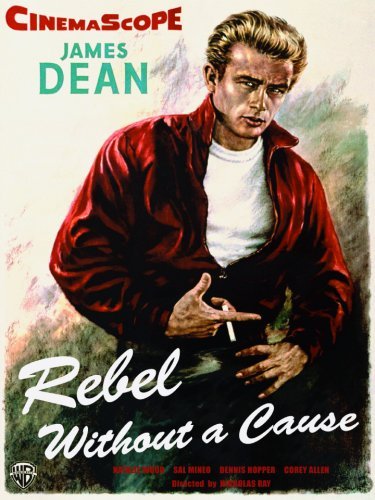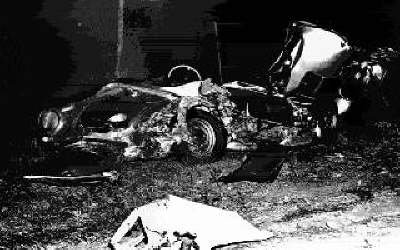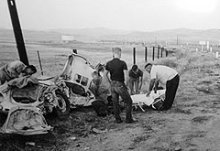James Dean was born on February 8, 1931, in Marion, Indiana. He was the only child of Winton Dean, a dental technician, and Mildred Wils Dean, a farm wife. When James was five years old, his family moved Santa Monica, California. Four years later, Mildred died suddenly from cancer. Winton decided to stay on in California, but he sent James back to Indiana, where he was raised by his aunt Hortense and his uncle Marcus Winslow on their small farm in Fairmount.
Hortense and Marcus decided that the best way for them to help James recover from his loss was to offer the boy an all-American childhood. they enrolled him in 4-H Club and encouraged his artistic nature with dance classes and drawing lessons.
When James was 11 years old, Marcus taught him how to use a BB gun. On his next birthday, his aunt and uncle gave him a motorbike. By the time James reached high school, he was actively involved in sports. Despite his being only five feet seven inches tall, he was accepted on the basketball team. He also ran track. But his favorite activity was drama.
The school's drama teacher, Adeline Nall, was particularly impressed by James's talent and encouraged him to audition for productions. In his senior year, James competed in a statewide dramatic speaking event. His high charged performance included yelling and a physical collapse onstage. To Adeline Nall's delight, he came in first place. Several months later he repeated his performance in a nationwide contest, only to lose on a technicality: He would not cut his 12-minute speech to fit the allotted 10 minutes!
Following his high school graduation, James hoped to study theatre in college. But his father, who had kept in steady contact with James from California, convinced him that his idea was impractical. Instead Winton encouraged his son to study law. In the summer of 1949, James moved in with Winton and his new wife in Santa Monica.
That fall James enrolled in a prelaw program at Santa Monica City College. The many years that they had been separate contributed to an uneasy relationship between father and son. They bickered constantly. Winton was especially peeved when James transferred to DCL in his sophomore year.
He understood that James was attracted to the school because of its nationally renowned theatre department, but he felt his son was making a mistake. The situation worsened when James was cast in his first play at UCLA. He played Malcolm in Macbeth. Although James receive only mediocre notices for his performance, a talent agent who had seen the production was impressed and signed James as a client. A few weeks later, James landed his first professional job, appearing in a Pepsi-Cola commercial.
Realizing life with his father was never going to be easy, James left home and moved on campus. But the rowdiness of campus life turned him off, and a few months later, he was sharing a small apartment with a fellow theatre arts major, William Bast. Determined to succeed as a professional actor, James often cut classes to audition.
He supported himself working as a parking-lot attendant. In the spring of
1951, he was cast in his first dramatic television role as John the Baptist in Hill Number One. A group of high school girls who had seen the program were so smitten by James that they formed his first fan club.
In the summer of 1951, James met Rogers Brackett, an account superrvisor and television director. Impressed with Dean, Brackett became his mentor and recommended the younger man to his friends for parts in their television productions. A few months later, James moved in with Brackett. Bored and frustrated with the small roles he was attracting in Hollywood, James moved to New York, where he hoped to work exclusively in theatre. To pay the rent, he used his connection with Brackett to land a job rehearsing contestants for the game show "Beat the Clock".

"Jimmy was an insommiac - so at odd times and in odd places he would simply pass out, for a few minutes or a few hours, then wake up and set out again. He lived like a stray animal; in fact, come to think of it, he was a stray animal."...
|
Occasionally, he also appeared in minor parts on such live television shows as Studio One and Kraft Theater. James's acting style moved in a completely new direction when he became a member of the Actors Studio, which was headed by Lee Strasberg, who also taught such talented students as Marilyn Monroe, Marlon Brando, and Shelley Winters.
Once James became a member of the Actors Studio, it was the only thing that remained a constant in his life while he was living in New York. He was always changing apartments; either staying with friends or sharing Brackett's studio when he was in town. He dated frequently and established particularly close romantic relationship with Elizabeth Sheridan, a strugging dancer.
In October
1952 Brackett introduced James to Lemuel Ayers, who was preparing to produce Richard Nash's play "See the Jaguar". The introduction led to James's winning the lead role. Unfortunately, the play opened and closed within a week.
But WaIter Kerr, a highly respected and influential critic, saw the show and hailed Dean's performance as extraordinary. This caused several producers and casting directors to suddenly take notice of the young actor.
Even though his career had begun to take off, James was developing a reputation for being difficult. He arrived at rehearsals late, quarreled with directors over stage notes, missed cues, and frequently fell asleep. Dennis Stock, photographer who was Dean's friend, recalled, "Jimmy was an insommiac - so at odd times and in odd places he would simply pass out, for a few minutes or a few hours, then wake up and set out again. He lived like a stray animal; in fact, come to think of it, he was a stray animal."
In November
1954 Dean was cast as Bachir, the homosexual Arab houseboy in Andre Gide's The Immoralist. Geraldine Page and Louis Jourran received star billing. Ruth Goetz, who also appeared in the production, did not enjoy working with Dean: "The little son of a bitch was one of the most unspeakably detestable fellows to work with I ever knew in my life." Despite the unfavorable notices he received from his costars, Dean's perormance in The Immoralist won him the Daniel Blum Theater Award that season as "the best newcomer of the year."
Dean celebrated by buying himmelf a motorcycle. Shelley Winters, who first met Dean while they were studying together at the Actors Studio, recalled that he was a reckless driver who pulled unnecessary and dangerous stunts when he was behind the wheel.
Midway through the production's run, Dean gave the required three-week notice. He was returning to Hollywood to star in his first motion picture, East of Eden.
Elia Kazan, the movie's director, was aware of the dangerous stunts Dean pulled and forbade him to drive his motorcycle while the film was being shot. To keep a close eye on Dean, Kazan assigned him a lavish dressing room on the lot next door to his office. Years later, Kazan told reporters that he had never thought Dean was anything more than a limted actor who could work hard and that he was a very neurotic young man. He was perfect for the part of the boy in East of Eden, Kazan said, but even at that time the director felt that he was deeply troubled and that later Dean just got worse.
 |
Police arrived soon after the accident, there was little left of the Porsche Spyder... |
During the filming Dean became romantically involved with starlet Pier Angeli. Dozens of stories cropped up in fan magazines promising "intimate" details about their relationship.
The affair ended suddenly after a few months, when Pier gave in to pressure from her disapproving family. A short while later, she married pop singer Vic Damone. Dean pretended not to care, but his close friends could see that he was hurt by the news of their wedding.
The world premiere of East of Eden was held in New York City on March 10,
1955. Dean chose to stay in Hollywood and missed out on the festivities. The critics hailed him as "the screen's most sensational male find of the year."
His off-screen activities also entertained the press, and reporters had a field day writing about his often self-destructive exploits. Ezra Goodman, a reporter for Life magazine, wrote about Dean's impossible behavior in restaurants, reporting that if he thought he was not getting enough attention, "he would beat a tom-tom solo on the tabletop, play his spoon against a water glass with a boogie beat, pour a bowl of sugar into his pocket, or set fire to a paper napkin."
By the time Variety listed East of Eden as the country's top-grossing film, Warner Bros. had already signed Dean to a new contract. He was to star in nine films over a six-year period with a minimum salary of $15,000 per piccture. Dean's first big purchase upon signing of the contract was a $4,000 Porsche Speedster, which he immediately entered in a race in Palm Springs. Dean had never before driven a race car in competition, but he won the amateur class. He also placed third in the professional class. Winning a car race was exactly the kind of encouragement James did not need. A reporter who questioned him about his potentially dangerous new hobby received this response: "Racing is the only time I feel whole."
On March 28, 1955, the cameras rolled on Dean's next movie, Rebel Without a Cause, directed by Nicholas Ray and co-starring
Natalie Wood and
Sal Mineo. Dean was cast as Jim Stark, a rebellious teenager. His character had an unhappy relationship with his parents, and he also had trouble fitting in with his classmates at his new high school.
As soon as Rebel had finshed shooting, Dean started work on his third starring role as Jeff Rink in Giant, directed by George Stevens and co-starring Elizabeth Taylor and Rock Hudson.
Dean's role, in which he ages from 25 to approximately 45 by the story's end, challenged the actor to stretch his talents to the maximum. Like Kazan, Stevens forbade Dean to drive during the time the movie was being shot. Stevens even took the extreme step of having the studio confiscate the car it had lent to Dean.
The principal shooting for Giant was completed in September 1955. With two movies waiting to be released, Dean's career was moving at a smooth pace, but he was anxious to return to his favorite pastime, race-car driving.

James Dean's body was removed the following morning...
|
On September 30, 1955, Dean and his mechanic Rolf Wuertherich headed to Salinas for a race (At that time, Porsche would often send their mechanics to help their high profile customers). Several weeks earlier Dean had traded in his Speedster for a new Porsche Spyder, and he was anxious to see how it performed on the open road.
During the long drive, he was stopped by a traffic officer and given a ticket for driving 65 MPH in a 45-MPH zone. Unfortunately the ticket did not deter James Dean from speeding.
Shortly before 5.45pm he was once again speeding. Dean was on a narrow strip of road when he lost control of his car and crashed into an oncoming car. James Dean was killed on impact. He was 24 years old. The posthumous releases of Giant and Rebel Without a Cause have guaranteed that Dean will forever remain a romantic symbol of youth.
